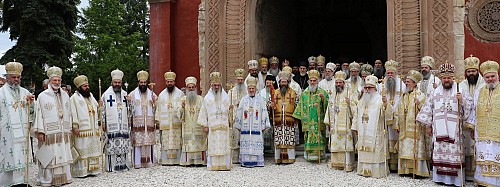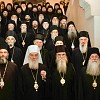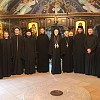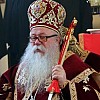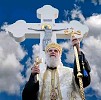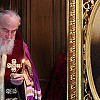Саопштење за јавност Светог Архијерејског Сабора Српске Православне Цркве са редовног заседања одржаног у манастиру Жичи и Београду од 9. до 18. маја 2019. године
Овогодишње редовно заседање Светог Архијерејског Сабора Српске Православне Цркве започето је 9. маја у манастиру Жичи, првом седишту аутокефалне Српске Цркве, а 800-годишњицу те аутокефалије, пуне црквене самосталности, великог дара Божјег и великог дела Светога Саве, прослављамо ове године. После свете саборне архијерејске Литургије и призива Светога Духа у храму манастира Жиче одржане су, под председништвом Његове Светости Патријарха српског г. Иринеја, прве саборске седнице у самом манастиру, 9. и 10. маја, да би Сабор наставио са радом у Патријашијском двору у Београду од 11. маја до завршетка овогодишњег заседања. У раду Сабора учествовали су сви епархијски архијереји Српске Православне Цркве осим Епископа западноевропског г. Луке.
На почетку прве саборске седнице Његова Светост Патријарх је присутним епископима упутио, по устаљеној пракси, приступну поздравну реч, у којој је указао на суштинска питања живота и мисије Српске Православне Цркве у савременом свету, препуном, с једне стране, великих духовних изазова и искушења, а са друге стране и отворених могућности за рад на духовној обнови нашег народа.
Већ на самом почетку свога рада Сабор је изузетну пажњу посветио богослужбеном прослављању и духовно-културном обележавању великог јубилеја, осамстогодишњице стицања аутекефалног статуса наше Цркве (1219 - 2019), како на нивоу читаве Цркве у манастиру Жичи и у Београду, у октобру, тако и по свим њеним епархијама. Ваља истаћи да ће прослава бити настављена и током читаве идуће, 2020. године, а одлучено је и да се те исте године молитвено и свечано обележи још један значајан јубилеј – стогодишњица уједињења покрајинских Цркава у једну јединствену Српску Православну Цркву и васпостављањa њеног статуса аутокефалне Патријаршије.
На позив Сабора, Патријаршију су посетили председник Републике Србије г. Александар Вучић и председавајући Председништва Босне и Херцеговине г. Милорад Додик. После заседања, у свечаној дворани за пријеме, Сабор је са дужном пажњом саслушао излагања двојице српских лидера о стању и проблемима нашег народа у Србији и Републици Српској, али и шире, као и о напорима и неравноправној борби са моћницима за очување Косова и Метохије у саставу Србије и о подршци и свеобухватној помоћи државе Србије нашем народу да опстане на најсветијој српској земљи, Косову и Метохији, и, паралелно, о братској сарадњи државних органа, образовних и културних установа и свих осталих носилаца јавне одговорности у Србији и у Републици Српској, на добро нашег народа с обе стране Дрине и на његово опште добро, ма где да живи.
Током Сабора одржана је и седница Централног тела за довршење Спомен-храма Светог Саве на Врачару, са извештајем о свим досадашњим радовима, извршеним уз велику помоћ државе и прилозима побожног народа, нарочито о постављању мозаикâ од стране руских уметника, и најавом свечаног великог освећења Храма следеће године.
Као и сваке године, Сабор се позабавио и питањима црквене просвете и стварањем услова за нормално функционисање Патријаршијске библиотеке и Музеја и Архива Српске Православне Цркве. Изабран је нови вршилац дужности ректора Богословије Светог Арсенија Сремца у Карловцима, протојереј мр Јован Милановић. Расправљало се и о сарадњи Цркве са надлежним органима Србије у процесу ревитализације Сремских Карловаца и стварања условâ за његову нову - у ствари стару - улогу важне духовне, културне и образовне кошнице српског народа.
Измењен је датум празновања светог Пајсија, патријарха пећког: уместо 2/15. октобра његов спомен ће се вршити 3/16. октобра на основу новооткривеног записа на његовим светим моштима.
Са жалошћу је констатовано деловање разних расколника и секташа.
Саслушани су и анализирани извештаји о раду Светог Архијерејског Синода и епархијских архијереја, као и добротворне фондације „Човекољубље” и других фондација и служби Српске Православне Цркве у протеклом периоду.
Извршена је арондација појединих епархија тако што је Епархија бањалучка уступила један број црквених општина, односно парохија, Епархији бихаћко-петровачкој, а Епархија зворничко-тузланска Епархији дабробосанској.
Сабор је једногласно доделио орден Светог Саве првог степена др Димитрију (Тракателису), донедавно архиепископу америчком у јурисдикцији Цариградске Патријаршије, за његову љубав и доброчинства учињена епархијама наше Цркве у Америци.
Размотрено је и стање наше Цркве у такозваном региону, односно у државама створеним на развалинама бивше Југославије, при чему је констатовано да су анимозност и дискриминација у односу на нашу Цркву присутне, у већој или мањој мери, готово свуда - у Хрватској, Босни и Херцеговини, Северној Македонији, а нарочито у Црној Гори, где је недавно потврђен антиевропски и антицивилизацијски предлог закона о Црквама и верским заједницама. Тим нацртом закона се специјално и намерно дискриминишу Епархије црногорско-приморска и будимљанско-никшићка, а предвиђа се чак и отимање светих храмова и њихово проглашавање за власништво државе (!). Таква решења укидају неотуђиво право грађанина на слободу вероисповести и савести и представљају директно мешање у унутрашње црквене послове. Ту су и покушаји насилног одузимања светињâ у корист канонски и реално непостојеће „Црногорске Православне Цркве” и претње да ће бити срушене поједине богомоље (црква на планини Румији и крстионица на Превлаци). Наравно, свуда - и у Црној Гори, и у Хрватској, и другде - има не мало часних појединаца и читавих заједница и организација које се залажу за правду и слободу свих. Тешко је и стање наше аутономне Охридске Архиепископије у Северној Македонији, где тренутно нема директног прогона архиепископа Јована, епископâ, клирикâ, монахâ и верникâ, али им стално над главом виси Дамоклов мач новог судског гоњења. Упркос томе, наша Црква је и даље, као и до сада, за дијалог са тамошњом Црквом која већ деценијама пребива у расколу и за решење проблема на аутентично канонској основи.
Поводом јавних ставова за обавезну вакцинацију деце или против ње, Сабор сматра да треба уважити разлоге научне медицине, али и бојазан родитељâ од њеног примања.
Највећи проблем Православне Цркве данас јесте црквени раскол у Украјини и промашени покушај Цариградске Патријаршије да тај проблем реши „преко колена”, на своју руку, без дијалога са канонском Црквом у Украјини и са Руском Православном Црквом као целином и без свеправославног саветовања. С тим у вези, Сабор остаје при свом досадашњем ставу: наша Црква не признаје новоустановљену парацрквену структуру у Украјини, на чијем челу су грађани Денисенко и Думенко, а налази се у литургијском и канонском општењу само и искључиво са канонском Украјинском Православном Црквом, на чијем челу се налази Његово Блаженство митрополит Онуфрије, и са свим осталим канонским Православним Црквама.
Сабор по ко зна који пут изражава своју запрепашћеност и огорченост услед неканонских упада епископâ и свештеникâ Румунске Православне Цркве у епархије Српске Православне Цркве у Источној Србији.
Односи са Римокатоличком Црквом и са Црквама Реформације у Србији, као и са Исламском заједницом Србије, традиционално су добри и коректни, што се, нажалост, не може рећи за односе са одређеним круговима Римокатоличке Цркве у Хрватској и Исламске заједнице у Босни и Херцеговини.
Чланови Светог Архијерејског Синода у новом сазиву су митрополит дабробосански Хризостом и епископи бачки Иринеј, шумадијски Јован и крушевачки Давид.
Доставља: епископ бачки Иринеј,
портпарол Српске Православне Цркве
The Communique of the Holy Assembly of Bishops
The Communique of the Holy Assembly of Bishops of the Serbian Orthodox Church
from their regular meeting held at Zica Monastery and in Belgrade, May 9-18, 2019
This year’s regular meeting of the Holy Assembly of Bishops of the Serbian Orthodox Church began on May 9, 2019 in Monastery Zica, the first headquarters of the autocephalous Serbian Church, while the 800th anniversary of autocephaly, full Church independence, that great gift from God and great achievement of Saint Sava, we celebrate this year. After the Holy conciliar Hierarchical Liturgy and the Invocation of the Holy Spirit at the monastery church of Zica Monastery, the first sessions, under the presidency of His Holiness Serbian Patriarch Irinej, were held at the monastery, May 9-10, 2019, while beginning May 11th the Assembly continued its work at the Patriarchate in Belgrade. Participating in the Assembly were all diocesan hierarchs of the Serbian Orthodox Church with the exception of Bishop Luka of Western Europe.
Per the established practice, at the beginning of the first Assembly session the Patriarch addressed the hierarchs in attendance with introductory remarks in which he pointed to the essential issues in the life and mission of the Serbian Orthodox Church in the contemporary world filled with, on the one hand, many spiritual challenges and temptations while on the other hand it is open with possibilities for work for the spiritual renewal of our people.
At the very beginning of the work of the Assembly special attention was dedicated to the liturgical celebration and spiritual-cultural commemoration of the great jubilee, the 800th anniversary since our Church received its autocephalous status (1219-2019), both the main celebrations for the entire Church to be commemorated at Monastery Zica and in Belgrade in October, as well on diocesan levels throughout. On the occasion of the great jubilee, the 800th anniversary of the autocephaly of our Church, in conciliar discussions regarding the manner in which the same was received a unanimous position of all hierarchs in attendance was pronounced of the absolute canonical character of St. Sava’s autocephaly. It should be noted that the celebration will continue throughout the following year, 2020, and it was decided that another significant jubilee be prayerfully commemorated that year – the 100th anniversary of the unification of the regional Churches into one, single Serbian Orthodox Church and establishing its status as an autocephalous Patriarchate.
Upon invitation of the Assembly, President of the Republic of Serbia Aleksandar Vucic and representative of the Presidency of Bosna and Hercegovina Milorad Dodik, visited the Patriarchate. After the meeting, in the formal reception hall, the Assembly listened with due attention as the two Serbian leaders presented the state and problems of our people in Serbia and the Republic Srpska, and beyond, as well as the efforts and the unequal battle with the ruling powers in preserving Kosovo and Metohija within the makeup of Serbia as well as the support and the all-inclusive help from Serbia to our people that they might survive on the most holiest Serbian land, Kosovo and Metohija, and, in parallel, of the brotherly cooperation from the government organs, institutions of education and culture and all other public bearers of responsibility in Serbia and Republic of Srpska, for the good of our people on both sides of the Drina and for their general good, wherever they might live.
During the course of the Assembly a meeting was held with the Central board for the construction of the St. Sava Memorial Church in Vracar, Belgrade, with reports of all completed work thus far, accomplished through the great help from the state as well as donations from the faithful, especially regarding the mosaics added by the Russian artists, and the announcement of the consecration of the Church next year.
As in previous years, the Assembly dealt with issues regarding religious education as well as creating the conditions needed for a normal functioning of the Patriarchate Library and Museum as well as an Archive premises for the Serbian Orthodox Church. Protopresbyter Jovan Milanovic was elected new acting rector of the St. Arsenije of Srem Seminary in Sremski Karlovci. There was discussion regarding the Church’s cooperation with the appropriate Serbian authorities regarding the process of revitalization of Sremski Karlovci and creating the conditions needed for its new – actually, old – role of an important spiritual, cultural and educational workplace of the Serbian people.
The date for commemorating St. Pajsije, Patriarch of Pec, was changed: instead of 2/15 October, his commemoration will be on 3/16 October, based on newly revealed documents on his holy relics.
The actions of various schismatic and sectarian groups were noted with sorrow.
Reports from the Holy Synod of Bishops and diocesan bishops were heard and analyzed as well as the charitable organization “Philanthropy” and other foundations and services of the Serbian Orthodox Church during the previous year.
A re-structuring of a few dioceses was completed so that the Diocese of Banja Luka gave up a number of its church school congregations, parishes, to the Diocese of Bihac and Petrovac, and the Diocese of Zvornik-Tuzla to the Diocese of Dabar-Bosna.
The Assembly unanimously awarded the Order of St. Sava of the First Degree to Dr. Demetrios (Trakatellis), the former Archbishop of the American jurisdiction of the Patriarchate of Constantinople, for his love and charitable works towards the dioceses of our Church in America.
Taken into consideration was the state of our Churches in the so-called region - that is, in the states created on the ruins of the former Yugoslavia – and it was concluded that there exist animosity and discrimination in regard to the presence of our Church, in more or less everywhere – in Croatia, Bosna and Hercegovina, North Macedonia and particularly in Montenegro, where recently an anti-European and anti-civilized motion for law was confirmed regarding Churches and religious communities. This draft of law specifically and deliberately discriminates against the Dioceses of Montenegro-Coastlands and of Budimlje and Niksic, and even the seizure of sacred churches and their proclamation for state ownership is foreseen (!). Such resolutions abolish the inalienable right of the citizens to freedom of religion and conscience and represent a direct interference in internal Church affairs. There are also attempts to violently take away our holy sites in favor of the canonically and realistically non-existent "Montenegrin Orthodox Church" and threated to destroy certain churches (the church on the mountain Rumija and the baptistery on Prevlaka). Of course, everywhere - both in Montenegro, in Croatia and elsewhere - there are not a few honorable individuals and entire communities and organizations advocating for the justice and freedom of all. The state of our autonomous Archdiocese of Ohrid in North Macedonia is also difficult, where currently there is no direct persecution of Archbishop Jovan, hierarchs, clergy, monastics and faithful, but the Sword of Damocles of new judicial persecutions is constantly hanging over their heads. In spite of this, our Church – as before – continues to support dialogue in solving the problems on an authentically canonical basis with the Church there which for decades has been in schism.
Regarding public attitudes towards or against the mandatory vaccination of children, the Assembly considers that the reasons for scientific medicine should be respected as well as the parents' fear of receiving it.
The biggest problem of the Orthodox Church today is the Church schism in Ukraine and the failed attempt by the Patriarchate of Constantinople in resolving the problem "knee jerk", on its own initiative, without a dialogue with the canonical Church in Ukraine and with the Russian Orthodox Church as a whole and without pan-Slavic counseling. In this regard, the Assembly’s present position remains: our Church does not recognize the newly established false-church structure in Ukraine, led by the citizens of Denysenko and Dumenko, and is only and exclusively in liturgical and canonical communion with the canonical Ukrainian Orthodox Church, led by His Beatitude Metropolitan Onufry, and with all the other canonical Orthodox Churches.
For the umpteenth time the Assembly expresses its astonishment and indignation after the uncanonical intrusions of bishops and clergy of the Romanian Orthodox Church in the Dioceses of the Serbian Orthodox Church in Eastern Serbia.
Relations with the Roman Catholic Church and with the Churches of the Reformation in Serbia, as well as with the Islamic communities in Serbia, are traditionally good and correct, which, unfortunately, cannot be said for relations with certain circles of the Roman Catholic Church in Croatia and Islamic communities in Bosna and Hercegovina.
The newly elected members of the Holy Synod of Bishops are Metropolitan Hrizostom of Dabar-Bosna and Bishops Irinej of Backa, Jovan of Sumadija and David of Krusevac.
Submitted by Bishop Irinej of Backa,
Spokesman for the Serbian Orthodox Church
|
| |||||||||||||
